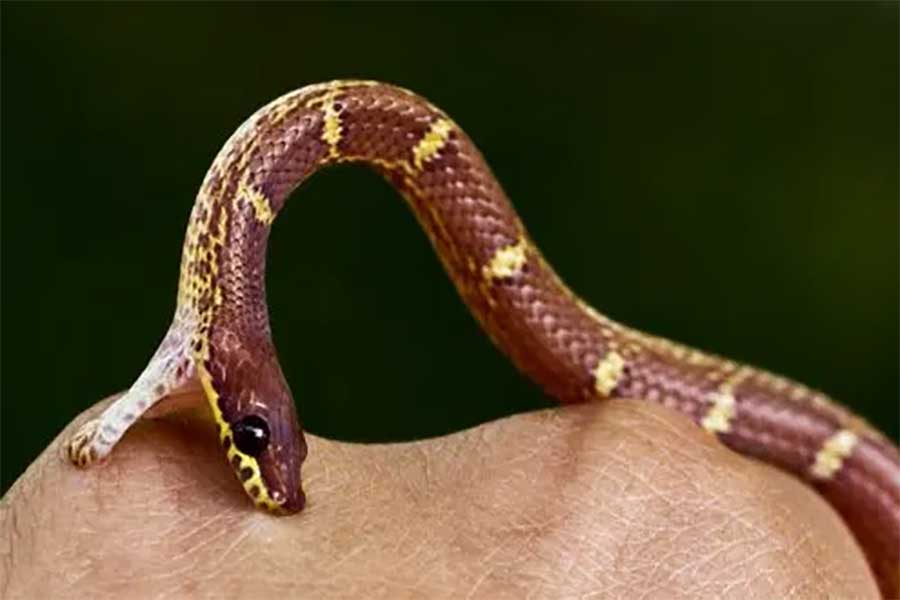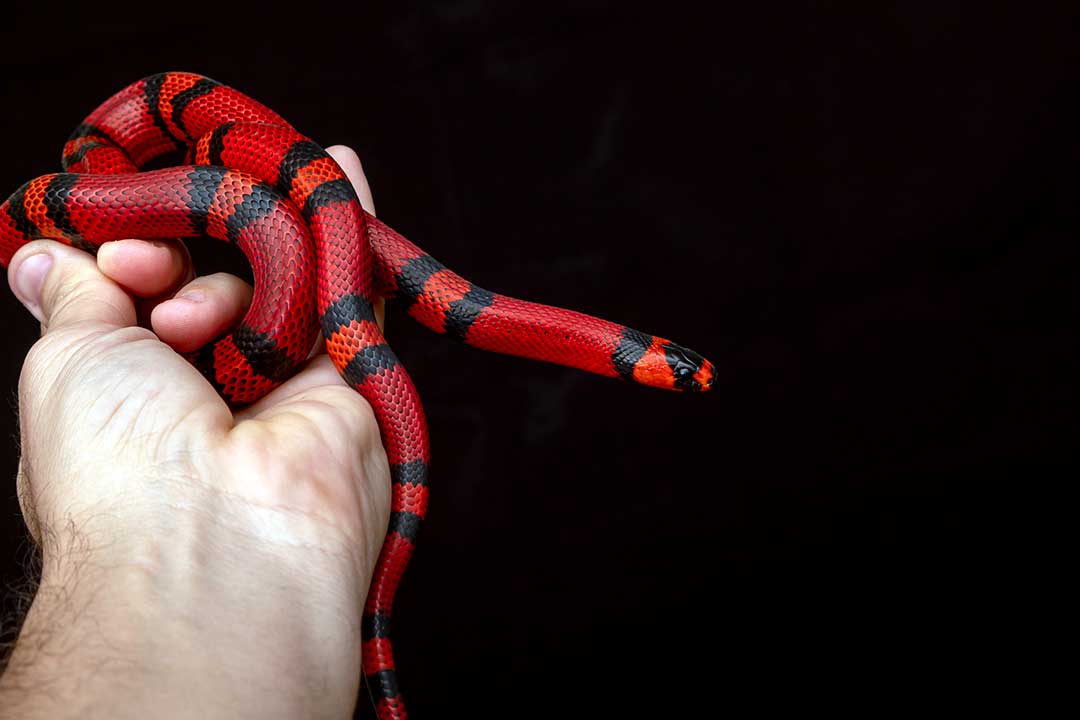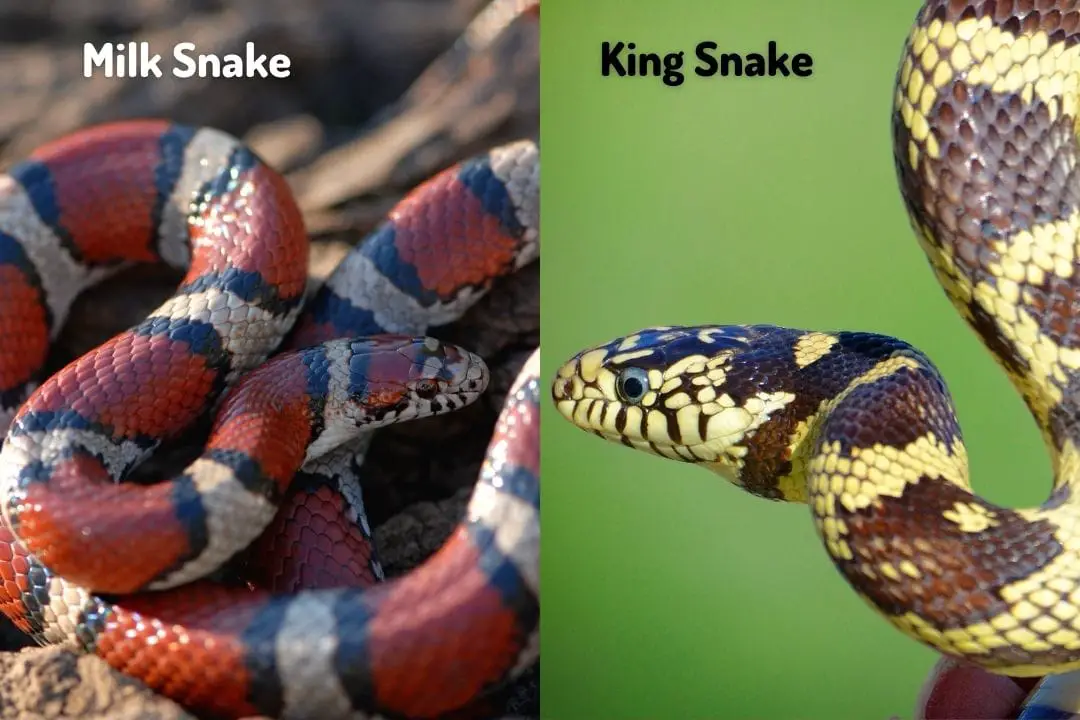Milk snakes are pretty popular among avid pet reptile enthusiasts out there because these snakes are pretty much more docile than their other slithery counterparts. However, does that mean that milk snakes are completely safe?
You might be wondering whether or not these snakes are actually not prone to biting you.
So, do milk snakes bite?
Milk snakes may bite even though they are more docile and less aggressive than other snake species. That’s because they will still bite out of self-defense or when they are startled. Of course, a hungry and cranky milk snake is most likely to bite you. However, milk snakes are not venomous.
The milk snake is still, after all, a snake.
It is still naturally wired to bite anyone or anything that may threaten its safety. But the good news here is that a milk snake’s bite should not worry you at all because this snake does not carry any venom.
Moreover, as long as you know how to properly handle a milk snake, you will be able to minimize the chances of it biting you.
Everything you need to know about caring for Milk Snakes in captivity:
Read our Milk Snake Care Sheet (Complete Guide)
Can a milk snake bite you?
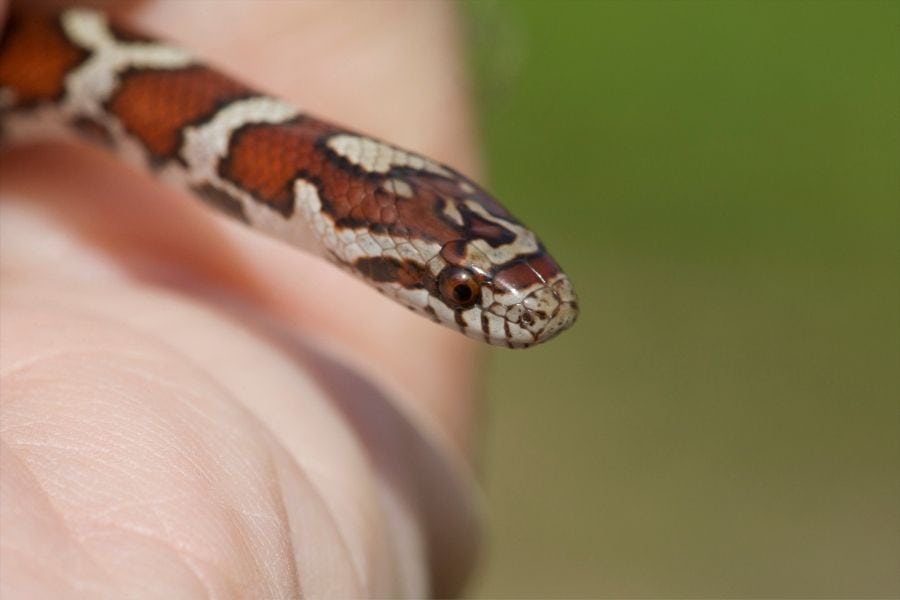
Snakes tend to be quite popular among reptile enthusiasts because they are majestic and colorful animals that can be quite captivating. While snakes are not always the most favored pets to keep, the milk snake is actually pretty popular because of how it is regarded as a safer reptile to keep regardless of whether or not the person may actually like keeping reptiles.
In that regard, there is a truth in the belief that milk snakes are safer than most other snake species because they are more docile and less aggressive.
As safe as milk snakes may be compared to other snakes or even other reptiles, does that mean that they are completely safe? Can a milk snake still bite you? To answer that question, yes, milk snakes still bite and will bite you in certain circumstances. Now, let’s talk more about the circumstances in which milk snakes can possibly bite you.
Hunger
Any animal regardless of species will become crankier and more aggressive whenever it is hungry. This includes the milk snake, which will more likely become aggressive whenever it is hungry and it has been a while since it was last fed. In some cases, even if you do feed it regularly, a milk snake can still bite you if the food you give doesn’t suit its nutritional needs.
That said, making sure that you regularly feed your milk snake with proper meals that allow them to meet their nutritional needs will make them less cranky. This will minimize the chances of your snake biting you out of aggression due to hunger.
Association
This is one of the cases where a milk snake will bite you not because it was cranky or aggressive but only because it associated your hand with food.
Such a case usually happens when you feed your milk snake by hand or when you are quite close to it while you are feeding it. That’s because the snake will begin to associate you with food and will bite you due to that association.
So, the key here is to make sure that you do not hand-feed your milk snake. These snakes can do well enough without your assistance whenever it’s feeding time. As such, it is best to just place its food in its enclosure and allow it to eat it without your assistance. Or, if your assistance is needed, just make sure that you use tongs or anything stick-like as long as you don’t use your hands.
It was startled
Anything will attack you or try to defend itself when startled. So, in your milk snake’s case, it will most likely try to attack you out of self-defense if it is startled or if you moved too quickly and too fast to the point that it thought that you were going to attack it.
After all, the milk snake’s natural predator in the wild tends to strike quickly and fast as well.
That’s why it is important that, when you are approaching your milk snake to handle it, you do it steadily and slowly so that the snake will have a moment to process what is happening and for it to assess whether or not you are a threat. Moving too fast will only make it tap into its natural instincts of biting you without even assessing the situation.
You were rough with it
When you handle a snake, it is best that you do it carefully or gently so that the reptile won’t see you as a threat. That’s why handling a milk snake requires that you become as gentle to it as possible because being a bit too rough with it might hurt it. And once a snake is hurt, it will attack out of retaliation or in self-defense.
Handling in the middle of shedding
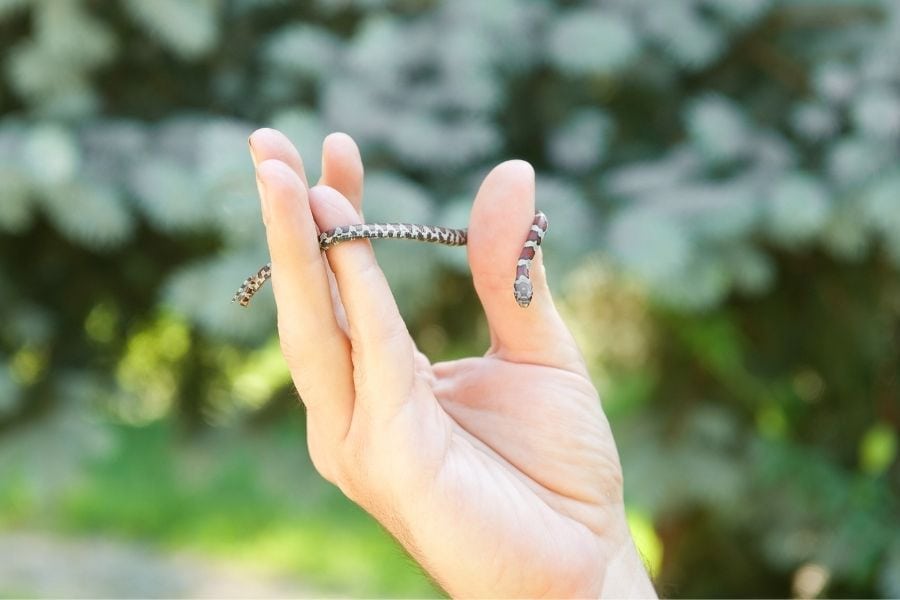
Snakes tend to be quite cranky whenever they are in the middle of shedding because they need the energy to shed. Moreover, shedding might even be painful for some reptiles, which include snakes.
That’s why you should never handle your milk snake whenever it is in the middle of shedding. You will notice that it is shedding when there is some loose skin on its body. So, when you do notice that the snake is shedding, just leave it be and avoid handling it for a while until it has completely shed its skin.
What happens when a milk snake bites?
So, if you do happen to find yourself getting bit by a milk snake or if you are simply wondering what happens to you when a milk snake bites you, there should be no cause for concern because there is nothing bad that will happen to you as a direct result of a milk snake’s bite.
That means that a milk snake’s bite is probably the safest bite you can get from a snake. And let’s talk more about the reasons why milk snake bites are typically harmless.
They are non-venomous snakes
The one thing you need to know about milk snakes is that they are non-venomous snakes that carry no venom whatsoever because they don’t have sacs that allow them to produce venom. They may be similar to coral snakes, which are venomous snakes, in terms of appearance but milk snakes are completely safe as far as what their bites can do.
They have tiny teeth
On top of how milk snakes don’t have venom, their teeth are so tiny. Unlike coral snakes, milk snakes don’t have fangs, which are supposed to be what delivers a snake’s venom whenever it bites. Instead, milk snakes have teeth that are so small that they can barely break the skin or may not even be sharp enough to draw blood.
Can a milk snake bite make you sick?
While the milk snake’s bite should be safe enough because these snakes don’t carry venom and have teeth that are too small to cause a lot of damage, you might still be wondering if the bites can make you sick. That is, of course, if their bites can even actually penetrate your skin and draw blood.
To begin with, even though milk snakes have small teeth that are unlikely to cause a lot of damage, they can still make you sick if you are not careful enough with how you treat your wound.
That’s because a milk snake’s teeth can carry bacteria coming from the mice and rats that it ate. Of course, the bacteria can easily multiply in its mouth. The bacteria from a snake bite may be enough to make you sick or, at the very least, cause infection or irritation in the area that was bitten.
As such, it is imperative that you immediately wash and clean your wound after it was bit by a milk snake. You shouldn’t worry about getting sick or infected as long as you promptly cleaned your wound from a snake bite even though the bite was not even strong enough to draw blood or break skin.
Do milk snake bites hurt?
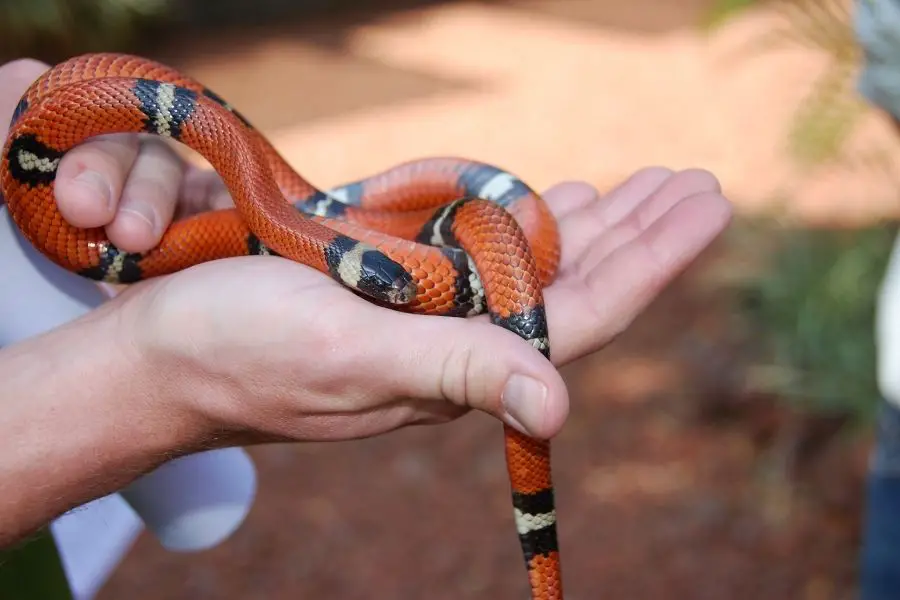
Lastly, if you do get bit by a milk snake, does the bite hurt? As mentioned, milk snakes have small teeth compared to other non-venomous snakes. And the bites are unlikely to break the skin because of how small the milk snake’s teeth are. This means that it is also unlikely that a milk snake bite will even draw blood.
In that regard, what you will probably feel from a milk snake bite should be more of a stinging sensation rather than actual pain. The bite should not be strong enough to make you wail in agony but there might be a bit of pain coming from the stinging sensation of a milk snake bite. It’s not completely painless but a milk snake’s bite shouldn’t be something that should make you fear it because of how it won’t be able to cause too much pain and damage.
Sources
https://www.livescience.com/53333-milk-snakes.html
https://www.oriannesociety.org/faces-of-the-forest/on-myths-and-milksnakes/
